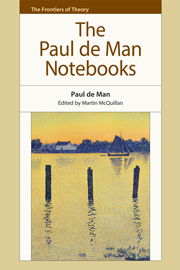Book contents
- Frontmatter
- Contents
- Series Editor's Preface
- Acknowledgements
- Dedication
- Introduction: ‘The Unimaginable Touch of Time’: The Public and Private in the Notebooks of Paul de Man
- PART I Texts
- PART II Translations
- PART III Teaching
- PART IV Research
- Appendix. The Notebooks of Paul de Man 1963–83
- Bibliography
- Index of Names
Series Editor's Preface
Published online by Cambridge University Press: 05 December 2014
- Frontmatter
- Contents
- Series Editor's Preface
- Acknowledgements
- Dedication
- Introduction: ‘The Unimaginable Touch of Time’: The Public and Private in the Notebooks of Paul de Man
- PART I Texts
- PART II Translations
- PART III Teaching
- PART IV Research
- Appendix. The Notebooks of Paul de Man 1963–83
- Bibliography
- Index of Names
Summary
Since its inception Theory has been concerned with its own limits, ends and after-life. It would be an illusion to imagine that the academy is no longer resistant to Theory but a significant consensus has been established and it can be said that Theory has now entered the mainstream of the humanities. Reaction against Theory is now a minority view and new generations of scholars have grown up with Theory. This leaves so-called Theory in an interesting position which its own procedures of auto-critique need to consider: what is the nature of this mainstream Theory and what is the relation of Theory to philosophy and the other disciplines which inform it? What is the history of its construction and what processes of amnesia and the repression of difference have taken place to establish this thing called Theory? Is Theory still the site of a more-than-critical affirmation of a negotiation with thought, which thinks thought's own limits?
‘Theory’ is a name that traps by an aberrant nominal effect the transformative critique which seeks to reinscribe the conditions of thought in an inaugural founding gesture that is without ground or precedent: as a ‘name’, a word and a concept, Theory arrests or misprisions such thinking. To imagine the frontiers of Theory is not to dismiss or to abandon Theory (on the contrary one must always insist on the it-is-necessary of Theory even if one has given up belief in theories of all kinds).
- Type
- Chapter
- Information
- The Paul de Man Notebooks , pp. viii - ixPublisher: Edinburgh University PressPrint publication year: 2014

